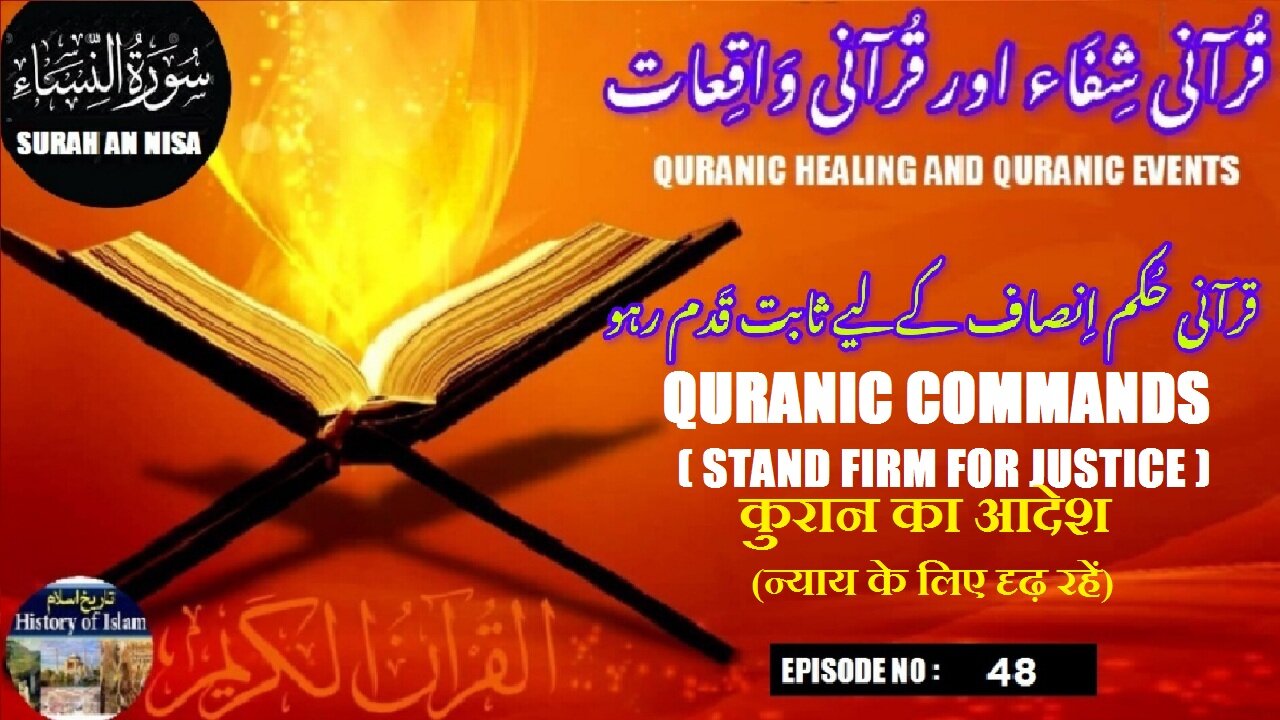Premium Only Content

Quranic Order Stand firm for justice न्याय के लिए दृढ़ रहें قرآنی حکم انصاف کے لیے ثابت قدم رہو
@islamichistory813 #stand #firm #for #justice #qurans #powerful #command #healing #and #events #from #the #quran #historical #stories #and #events #quranicstories #selfhealing #success #stories #striking #events #in #history #quranstories, #storiesfromthequran #religious #creation #stories #trending #quran #short #historical #loves #historical #heroes #what #is #true #strength #calm #quran #recitation #for #babies #islamic #healing
Stand Firm for Justice: Quran’s Powerful Command in Surah An-Nisa (4:135)
Assalamu Alaikum, wa Rahmatullahi wa Barakatuhu.
Brothers, sisters, friends and elders, we are presenting the 48th episode of the Islamic informative video based on healing and events from the Holy Quran, and in this episode we will describe. Stand Firm for Justice; Quran’s Powerful Command in Surah An-Nisa (4:135)
Quranic Commands on Justice and Fair Dealing: Stand Firmly for Justice as Witnesses to Allah (Surah An-Nisa 4:135)
Justice is one of the central themes of the Holy Quran and a pillar of Islamic ethics. Among the most powerful and far-reaching verses on this subject is Surah An-Nisa (4:135), which says: *“O you who believe! Stand firmly for justice as witnesses to Allah, even if it be against yourselves, or your parents, or your relatives—whether one is rich or poor—Allah is more worthy of both. So do not follow \[personal] desires, lest you not be just. If you distort or decline to give testimony, then indeed Allah is ever acquainted with what you do.”* This verse provides a comprehensive command about justice, reminding believers that standing for the truth is not optional or situational—it is a religious obligation. It forms the moral foundation of a just society and defines the personal integrity expected of every believer.
The verse begins with the phrase *“O you who believe!”*—a familiar opening in the Quran, used when introducing commands that are tied directly to faith and obedience to Allah. Here, Allah is calling on the believers to demonstrate their commitment to Him through upholding justice. This tells us that justice is not merely a social or legal value; it is a reflection of a person's relationship with their Creator. A true believer is one who stands up for what is right, even if it is difficult or goes against personal interests. It elevates the act of justice from a worldly matter to an act of devotion, making justice a form of worship.
The command to *“stand firmly for justice”* implies unwavering dedication. Justice in the Quran is not passive; it requires action, courage, and consistency. To “stand firmly” is to not compromise, not remain silent, and not shy away from speaking the truth when injustice is taking place. Whether in a courtroom, within a family dispute, or in the workplace, a Muslim is commanded to be an active upholder of justice. The word “firmly” suggests that justice must not bend to pressure, emotions, or social influence. The believer is urged to remain steadfast, regardless of consequences.
The next phrase, *“as witnesses to Allah,”* is deeply significant. It means that whenever a believer upholds justice, they are doing it not to impress others, win arguments, or gain approval, but as a testimony before Allah. This removes worldly bias and forces the believer to remember that their actions are being watched and judged by the One who knows all. It instills a deep sense of accountability and sincerity. Being a witness to Allah implies telling the truth without distortion, exaggeration, or omission. It is a solemn duty, one that carries both spiritual weight and social responsibility.
The verse then takes this idea further by stating that one must uphold justice *“even if it be against yourselves, your parents, or your relatives.”* This part of the verse is what makes this command truly revolutionary. In many societies, loyalty to family or tribe often overshadows truth and fairness. People tend to protect their own, cover up wrongdoing, or manipulate facts to favor those they love. The Quran, however, demands something greater: complete impartiality. Truth and justice must be upheld even if it exposes one’s own fault or implicates someone close. This is a direct challenge to favoritism, nepotism, and tribalism—forces that often destroy fairness in both small communities and entire nations.
Furthermore, the verse emphasizes that justice must be served *“whether one is rich or poor.”* This addresses a major social problem where the wealthy often escape justice due to influence, while the poor are either unfairly punished or excessively pitied. The Quran states that both rich and poor are equal in the eyes of Allah, and justice must not tilt in favor of either. Allah knows their circumstances and is more capable of protecting their rights than any human judge. This prevents any emotional manipulation, fear of backlash, or misuse of power from interfering in delivering fair judgment.
The command *“do not follow your desires”* highlights another important aspect of Quranic justice: the internal battle. Desires such as anger, greed, jealousy, or fear can corrupt judgment. The Quran warns against letting personal feelings interfere with fairness. A just person must rise above their ego, preferences, and interests to ensure that what is right is done, no matter how uncomfortable or unpopular.
Finally, the verse concludes with a warning: *“If you distort or decline to give testimony, then indeed Allah is aware of what you do.”* This is a serious reminder that Allah sees all actions, including hidden motives and concealed truths. Whether someone twists facts or remains silent to protect themselves or others, such behavior is noted and held accountable by Allah. It serves as both a deterrent and a spiritual encouragement for believers to be honest and brave in all matters of justice.
In conclusion, Surah An-Nisa (4:135) lays down a timeless and universal standard of justice. It urges believers to uphold truth in every situation, regardless of personal, emotional, or social pressures. The Quran’s vision of justice is bold, uncompromising, and rooted in faith. By standing firmly for justice as witnesses to Allah, believers contribute to a world built on fairness, trust, and divine accountability. This command is not only a blueprint for a just society but also a path to spiritual excellence.
With this, we ask for your permission until tomorrow and pray to Allah Almighty to grant us the ability to act on the Quran and Hadith, Amen
Allah Hafiz
============================
-
 5:29
5:29
ISLAMIC HISTORY
10 hours agoBiography of Islamic Scholar Mahja Kahf scaler mahaja kahaf سوانح حیات اسلامی سکالر محجہ کہف
1 -
 LIVE
LIVE
StuffCentral
1 hour agoI'm baaack (no you can't play with me.. unless you a healer)
21 watching -
 2:25:11
2:25:11
TheSaltyCracker
3 hours agoTrump Is Not Dead ReEEeStream 8-31-25
49.2K78 -
 LIVE
LIVE
THOUGHTCAST With Jeff D.
1 hour agoLabor Day Weekend FORTNITE With THOUGHTCAST Jeff & the squad
52 watching -
 DVR
DVR
Rallied
4 hours ago $2.24 earnedSolo Challenges All Day
26.5K1 -
 LIVE
LIVE
iCheapshot
4 hours agoCall of Duty: Black Ops Campaign
37 watching -
 4:39:16
4:39:16
Meisters of Madness
5 hours agoMadness in a Pod
6891 -

HELMETFIRE
1 hour ago🟢GAMING WITH FIRE EP9🟢
587 -
 1:24:08
1:24:08
Jean-Claude@BeyondMystic
13 hours ago🌀 THE WACKY WOO SHOW 3I ATLAS ALIEN INVASION with DICK ALLGIRE & JC - AUG 31 , 20254
34.9K50 -
 2:26:21
2:26:21
vivafrei
12 hours agoEp. 279: Patel's GF Sues for Defamation! Rogue Judges vs. Trump! Raja Jackson, Kick Stream & MORE!
134K69